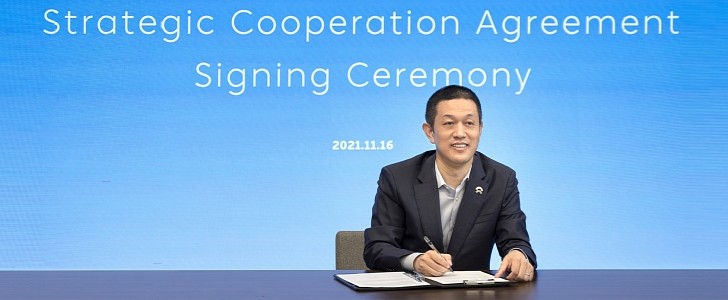Most oil companies now prefer to say that they sell energy, not only fossil fuels. That also seems to be the path Shell decided to follow. The difference it has compared to its competitors is that it now joined forces with NIO to create not only charging stations for EVs but also some of the battery swapping stations that made the Chinese carmaker famous.
According to the deal, the two companies signed on November 25, NIO and Shell will build and manage 100 battery swapping stations in China by 2025. They will also start to build pilot stations in Europe beginning in 2022. NIO vehicles would also get access to Shell’s current charging station in the Old Continent.
For NIO car owners, the convenience involved with this deal is to have charging stations in more locations than NIO would be able to offer by itself. For Shell, associating with an innovative EV maker and having access to its battery swapping tech may help create a standard all carmakers could follow.
NIO already said that it was open to allowing other companies to use its battery swapping solution. What the company argues is that this would require a solid commitment to the idea and large-scale synergies among these other companies and NIO.
This is not the first time NIO stated that it was open to collaboration with other companies. In September, William Li said that his company considered using idle capacity from European automakers to produce its cars locally. If the NIO CEO managed to establish such deals, that could be the path for achieving broader partnerships.
The main issue with having a battery swapping technology restricted to a single car company is that expanding it depends on getting such a company to have a larger market share. If other automakers also offered the same solution and it was compatible with that in other cars, concerns about high voltage and fast charging would not be as pressing as they now are for electric mobility. Maybe the world's largest gasoline retailer is the neutral party that will convince other car manufacturers to adopt the battery swapping standard NIO created.
For NIO car owners, the convenience involved with this deal is to have charging stations in more locations than NIO would be able to offer by itself. For Shell, associating with an innovative EV maker and having access to its battery swapping tech may help create a standard all carmakers could follow.
NIO already said that it was open to allowing other companies to use its battery swapping solution. What the company argues is that this would require a solid commitment to the idea and large-scale synergies among these other companies and NIO.
This is not the first time NIO stated that it was open to collaboration with other companies. In September, William Li said that his company considered using idle capacity from European automakers to produce its cars locally. If the NIO CEO managed to establish such deals, that could be the path for achieving broader partnerships.
The main issue with having a battery swapping technology restricted to a single car company is that expanding it depends on getting such a company to have a larger market share. If other automakers also offered the same solution and it was compatible with that in other cars, concerns about high voltage and fast charging would not be as pressing as they now are for electric mobility. Maybe the world's largest gasoline retailer is the neutral party that will convince other car manufacturers to adopt the battery swapping standard NIO created.











